15 Signs Of Emotional Detachment In Your Relationship
Recognize these signs early to work on the growing distance between you and your partner.

Image: Midjourney/ StyleCraze Design Team
What causes emotional detachment, and what can you do about it? We all have emotions, albeit some more than others. As people get older, they learn to mask their feelings. As humans, we crave connection as it is a vital component of our life. It cannot be easy to connect with others without feeling emotions. Thus, you must believe in empathizing, comprehending, and communicating with fellow humans. The flip side of this coin, though, is emotional detachment or apathy. It can significantly impact your personal life, leaving you feeling hollow and tired. This article discusses signs of emotional detachment in your relationship and how to deal with them. Keep scrolling.
In This Article
What Is Emotional Detachment?
Emotional detachment can be described as a psychological experience that is characterized by a lack of feeling or connection to people and things around you.
The person who is experiencing this phenomenon subconsciously mutes their feelings and emotions, generally to build a wall around their psychological brain to protect themself. Emotional detachment can occur in a relationship when one of the partners avoids emotional intimacy –– whether intentionally or unintentionally.
One way this can manifest is when a person strictly avoids uncomfortable situations that give rise to anxiety. Many people also seek personal boundaries by putting themself physically apart when dealing with others displaying emotion. Both are based on the need to distance themself, also called detachment. This distancing can severely impact the emotional connection in the relationship. Let’s take a look at what detachment means.


Detachment basically means being objective. A person is deemed to be detached when they are able to separate themself from an uncomfortable situation emotionally. Life often throws hurdles at us that may break us down, and one way of dealing with it is by detaching ourselves. This process of dissociation requires stepping back and disconnecting themselves from a situation to look at things objectively – whether it is related to relationships, friends, hobbies, work, or other things.
Detachment is often mistaken as disinterest or dispassion, but there can be more to it. It can also be described as being fair, objective, impartial, or neutral. However, when it comes to emotional detachment, it is not being able to or not wanting to open up and connect to someone.
When you start feeling that your partner has begun to detach themself or has never really tried to get close and connect to you, it can be truly devastating. You may keep wondering if you have done something wrong that has resulted in this indifferent behavior. You may even think that they want to break up or divorce or have an affair, owing to the said indifference.
 Did You Know?
Did You Know?An emotional detachment can arise from various factors, like physical, psychological, and neurological issues. Learn more below.
Key Takeaways
- Emotional detachment is a feeling of disconnect
- If you often feel lonely or disconnected in a relationship, you may be experiencing emotional detachment.
- If your partner does not share their worries with you, is not affected by your emotions, or seems apathetic during an argument, they may be emotionally detached.
What Causes An Emotional Detachment?
Emotional detachments are often caused by a significant loss, grief, trauma, or abuse and become a form of self-protection or attachment. In some cases, this can also be linked to developing a disorganized attachment, as people may have conflicting or inconsistent responses concerning closeness and separation. This may make it hard for them to form stable emotional connections later on.
An emotional detachment can also be a result of mental health issues such as depression, post-traumatic stress disorder (PTSD), or anxiety. Neurological conditions like schizophrenia, hormonal imbalances, brain injuries or certain medications may also cause an individual to feel emotionally numb. In such cases, a therapist or a health professional can provide the required treatment. Alcohol or substance abuse may make the emotional detachment worse.
High levels of stress at work or in relationships are also prevalent causes. This can be a momentary response or develop into a recurring behavior that has a significant impact on relationships. Keep reading to learn how to recognize signs of emotional detachment in a relationship.
Signs Of Emotional Detachment In Your Relationship

If you feel lonely and disconnected all the time in your relationship, you may be experiencing emotional detachment from your partner. No matter how much you beg for intimacy and closeness, it seems that your partner is deaf to your needs. You may even feel that your partner looks right through you as if you are not even present with cold, disinterested eyes. What exactly is going on here? Why does your partner seem to be slowly pulling away? Why does it seem like you are the only one trying to connect, keep the communication open, and help this relationship stay alive? Could it be that your partner is emotionally immature, making it challenging for them to express their feelings or meet you halfway?
Understanding what is going on will help you figure out what to do. Pay attention for these warning signs in your relationship.
1. Your Partner Seems Disinterested In What You Have To Say
Whenever you are sharing something that happened during your day or pouring your heart out to your partner, they look slightly bored or even irritated. Instead of both of you having an engaging conversation, it is always one-sided. You always seem to be trying to build closeness, but your partner is not interested in the least. Experiencing this aloofness from your partner everyday might make you feel a sense of isolation.
2. They Do Not Share Their Problems Or Worries With You

You used to be the first person your partner turned to when they were worried, upset, or had a bad day. But not anymore. In fact, even when you know that something is wrong and ask your partner about it, they clam up. You are no longer invited into their private life any longer. It feels as if your partner no longer wants to be authentic or vulnerable with you. You feel more and more like polite strangers or roommates than lovers due to your partner’s unfeelingness and coldness.
3. They Always Put Their Needs Above Yours
Your partner downright neglects to do nice things for you. They rarely, if ever, put your needs above their own. They don’t care if you are freezing — God forbid if you reset the thermostat! It is always set to your partner’s preference. Your partner seems to have stopped considering your feelings when taking actions or making decisions. They are not at all worried about the impact these little things have on you or the relationship.
4. They Are Not Moved By Your Emotions

In your desperation to get your partner’s attention, you may throw a tantrum or get intensely emotional or angry. Your feelings of rejection and pain spill over in tears. But your partner’s numbness might make you feel that they don’t care about your emotions. They seem oblivious to your emotions; they don’t care if you are suffering and need a bit of love and kindness.
Carlos Vettorazzi, a blogger, shared his experience of dating someone and understanding a void that he felt while in the relationship. He wrote, “The person was unwilling to enter conversations about their emotional experiences or their life, interests, wants, and needs. That evident lack of investment made me question whether they even liked me (i).” The feeling that something is wrong, even when everything seems perfect, is a sign to step back and analyze the situation.
5. They Are Always Withdrawn And Never Want To Spend Time With You
You expect to spend quality time with your partner where you can enjoy each other’s company. But it never happens. Every time you try to spend time together, they come up with an excuse for being busy. When you walk into a room where your partner is and try to talk to them, they get up and leave or pretend to be busy.
6. They Seem Apathetic During A Conflict

When conflicts happen, you probably want to sort things out and move forward because you care about the relationship. But your partner doesn’t seem to share the same urgency. Instead of showing frustration, sadness, or any strong emotion, they come across as indifferent – like they don’t care enough even to argue.
For example, when you bring up an issue, they might respond with a shrug, a dismissive eye roll, or a casual, “Whatever you say.” This lack of emotional investment can leave you feeling like you’re the only one invested in the relationship’s repair. It’s as if they’ve emotionally checked out, prompting you to question their commitment to the relationship.
7. They Have Stopped Expressing Their Love
‘I love you’ – these three little words have disappeared from their vocabulary. There was a time when they told you regularly that they love you and adore you, but now, they don’t. This is a huge red flag. They are 100% emotionally detaching from you. In fact, when you say “I love you” to your partner, all they give you is a tight-lipped smile.
8. They Are Disinterested In Sex

Your sex life is non-existent. It has almost fizzled out, and whenever you try to bring the subject up, your partner gets passive or irritated. Whenever you try to initiate sex, you are rebuffed in some way or the other. Sometimes, they even hint that you are the problem and the reason they no longer want to engage in sex.
9. They Never Try To Make You Happy
They did things to make you smile, cared about things you liked, and tried to make you feel loved. They wrote you poems and got you flowers. But all those things are no longer present. Now, they make little or no effort for you. You almost feel like a roommate that your partner is somehow tolerating.
10. They Are Rarely Affectionate, If Ever
They used to hold your hand when you would walk together. They used to cuddle with you in bed and hug you goodbye. But now, they have just stopped being affectionate. When you try to kiss or hug your partner, they quickly pull away. It seems as if your touch makes them uncomfortable or irritated.
11. They Shut Down When You Talk About The Relationship

It’s clear to both of you that things aren’t going well between you both. However, you are desperately trying to work on improving the relationship. But, whenever you try to discuss it, your partner either ignores you or throws a fit. They keep pretending like everything is fine or simply shut you up by refusing to discuss it at all. The most apparent thing is your partner is no longer interested in improving your connection.
12. They Often Give You The Silent Treatment
Your partner seems perfectly ok with sitting in silence with you – even when there are unresolved issues between you both. They more or less grunt indifferently or give you one-word responses to your attempts at reconciliation. There’s no effort from their side to reciprocate your attempts at conversation, much less to attempt making up. It feels like they are intentionally pulling away from you by refusing to talk.
13. They Don’t Ever Talk About The Future
If you ever bring up your dreams or future plans for the two of you, your partner escapes like zombies are after them. You get either an outright refusal to discuss your future plans or a super mellow response at best. Their non-committal answers make you feel that they are not as invested in your future together as you are. In reality, they no longer care enough even to discuss plans for the future with you.
14. They Purposely Do Things To Sabotage Your Relationship

Your partner may try to create detachment issues in the relationship by unnecessarily picking a fight or doing something that they know will make you upset or angry. If you get angry, they don’t have to attempt to connect with you because you seem to be the one with issues. Your partner uses your hurt and anger to build a wall around themself. They use it as an excuse for detaching themself.
 Quick Tip
Quick Tip15. They Get Angry When You Try To Have A Connection
Instead of shutting down or making excuses, when you try to establish a connection with them, they try to intimidate and control you by getting angry. They use anger as a buffer that prevents you from exploring what is truly the cause of their behavior and their changed attitude towards you. Their anger may scare you and keep you at an arm’s distance. You may be emotionally unable to break through the defenses they have built around themself.
Emotional detachment doesn’t always result in the end of a healthy relationship. A person can sometimes emotionally detach themself because of their own anxieties and fears or other emotions that are tormenting them and preventing them from being emotionally available. If your partner is open to the idea, go for couple counseling to figure out the issues and deal with them.
Recognizing these signs early on can really help you tackle emotional detachment head-on.You can open the door to better communication and understanding in your relationship by spotting the emotional distance before it grows. Acknowledging this gap is the first step toward rebuilding the trust and intimacy that may have faded, allowing you both to reconnect and strengthen your bond.
Dealing with emotional detachment can be tough, but there are steps you can take to work through it. Find out how!
Tips To Handle Emotional Detachment In Your Relationship
Here are a few practical tips to help:
1. Start An Open Conversation
Begin by calmly sharing how you feel about the emotional distance. Use “I” statements like, “I feel disconnected when we don’t talk about our feelings.” Avoid blaming or accusing your partner.
2. Set Small Goals For Connection
Try doing small things together, like cooking a meal, walking, or watching a favorite show. These shared activities can slowly rebuild emotional closeness.
3. Practice Active Listening
Active listening means giving your full attention to your partner, making eye contact, and responding with understanding. When your partner opens up, listen without interrupting or judging. Show empathy by acknowledging their feelings, even if you don’t fully agree.
4. Consider Couples Exercises
Try simple bonding exercises, such as asking each other meaningful questions or writing down things you appreciate about each other. These can create a sense of connection.
5. Seek Professional Help
If the detachment feels too overwhelming to manage on your own, remember that seeking professional help is a positive step. Consider couples counseling, where a therapist can provide tools to improve communication and rebuild emotional intimacy.
Infographic: 7 Signs of Emotional Detachment To Look Out For
Emotional support and stability are the key factors of a healthy relationship. Without emotional support, you might feel exhausted in the relationship and detached from your partner. That’s why it’s crucial to look out for signs of emotional detachment and address them to salvage your relationship. Check the infographic below to learn more about the 7 tell-tale signs of emotional detachment you should never ignore. Scroll down. Illustration: StyleCraze Design Team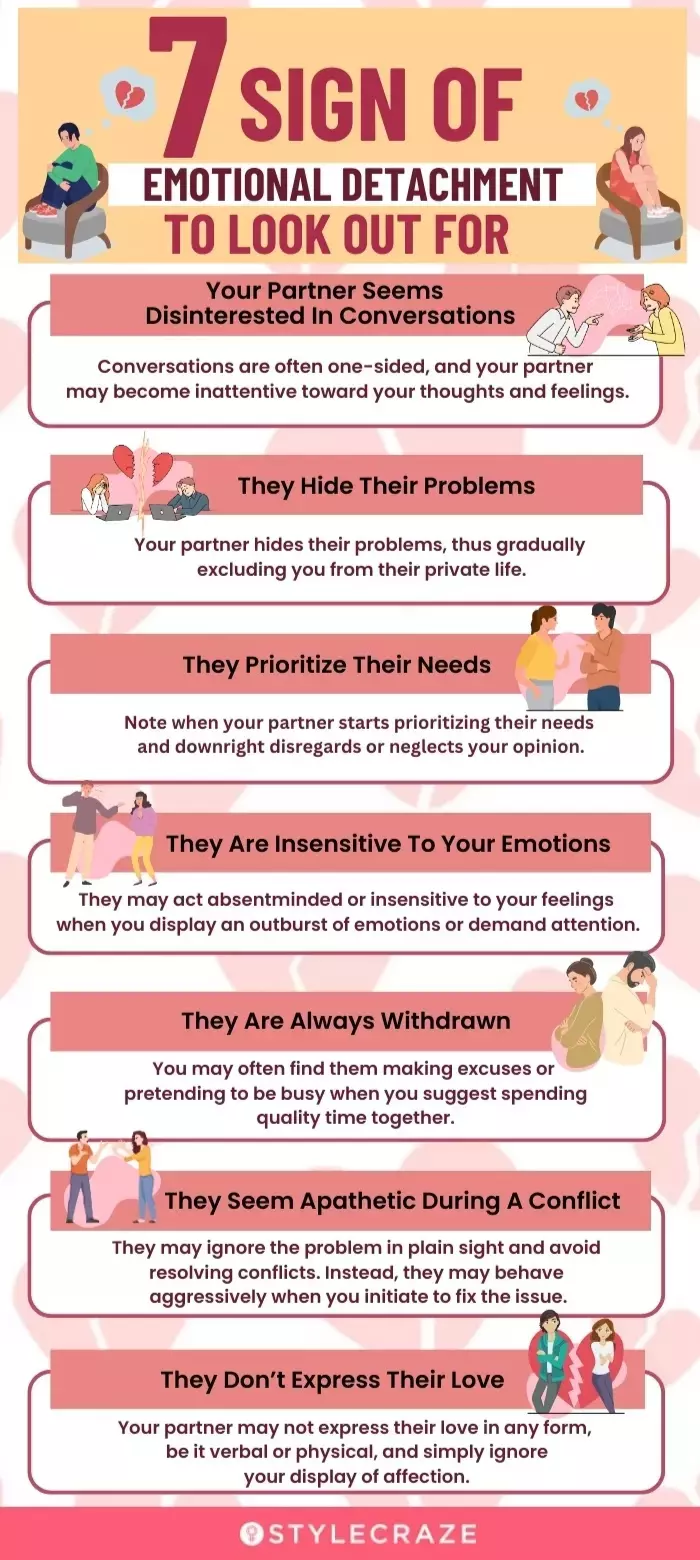
Now that you know what indicates emotional detachment in your relationship, do not hold yourself back from working on fixing things. After all, a relationship should bring joy and not sorrow. When you see these signs in your relationship with your beloved, be bold enough to acknowledge them and do the needful rather than enduring it with stoicism. Do not keep the issues unaddressed just because of your fear of losing that person. Remember, ups and downs in a relationship are inevitable, but your commitment to working things out is what it takes to make your relationship successful.
Frequently Asked Questions
How do you fix emotional detachment?
Many hardships and issues can arise in your life due to emotional detachment. Understanding emotional detachment in relationships can help you identify its impact and take steps toward improvement. Professional assistance may help fix your emotional detachment. Some ways to overcome emotional detachment include boosting your connections, learning to be vulnerable, practicing mindfulness, and staying away from drugs and alcohol.
How can I help my partner with emotional detachment?
It’s up to you to decide whether you want to continue a relationship with someone who is emotionally detached. But, whatever you choose to do, exercise caution. Have an open and honest conversation with them to find out what love means to them. Remember to be kind and patient, and try not to get too agitated.
How do you talk to someone who is emotionally detached?
Be honest about wanting to have a conversation in which to engage on a more profound emotional level. Encourage your partner to understand that it is safe to share their feelings with you and that doing so will strengthen your bond. Have a quick discussion about a subject that you and your partner agree on every two to three days. Do a fun activity that promotes emotional sharing at least once a week, such as walking your dog or going on a hike. While you two are cuddling in bed, have them start a conversation on a meaningful subject or a feeling.
Illustration: Signs Of Emotional Detachment In Your Relationship
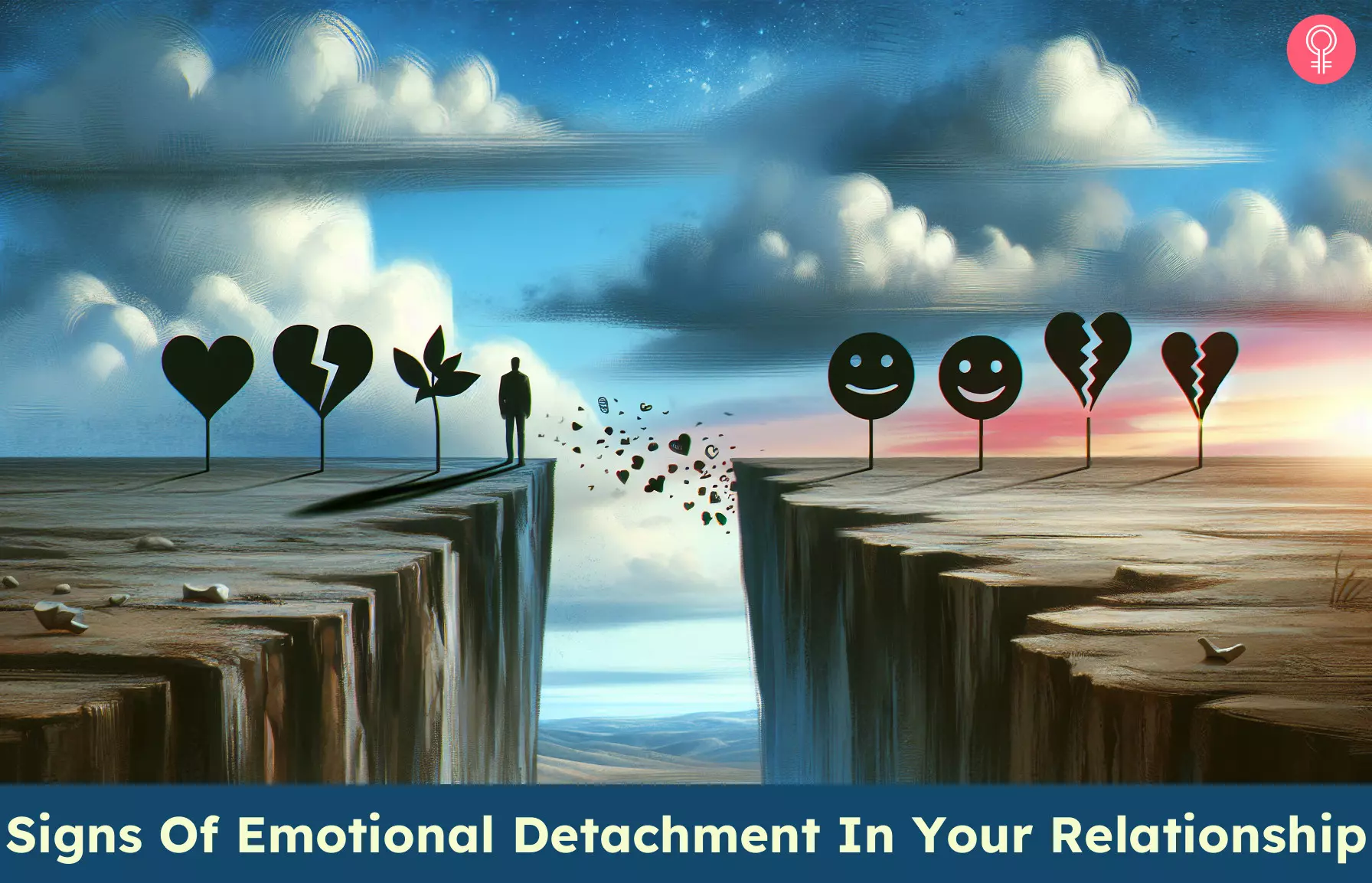
Image: Dall·E/StyleCraze Design Team
Personal Experience: Source
StyleCraze's articles are interwoven with authentic personal narratives that provide depth and resonance to our content. Below are the sources of the personal accounts referenced in this article.
i. How I Increase My Emotional Availability — And Succeed in Relationshipshttps://medium.com/change-becomes-you/how-i-increase-my-emotional-availability-and-succeed-in-relationships-3b298df100c1
Read full bio of Stephanie Mintz
Read full bio of Sneha Tete
Read full bio of Shatabdi Bhattacharya
Read full bio of Reshma Latif













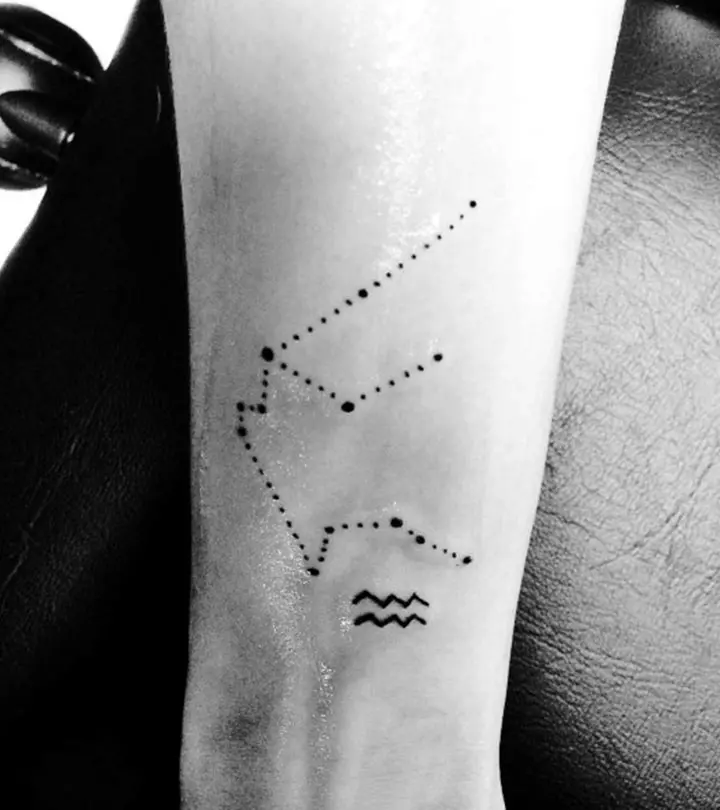
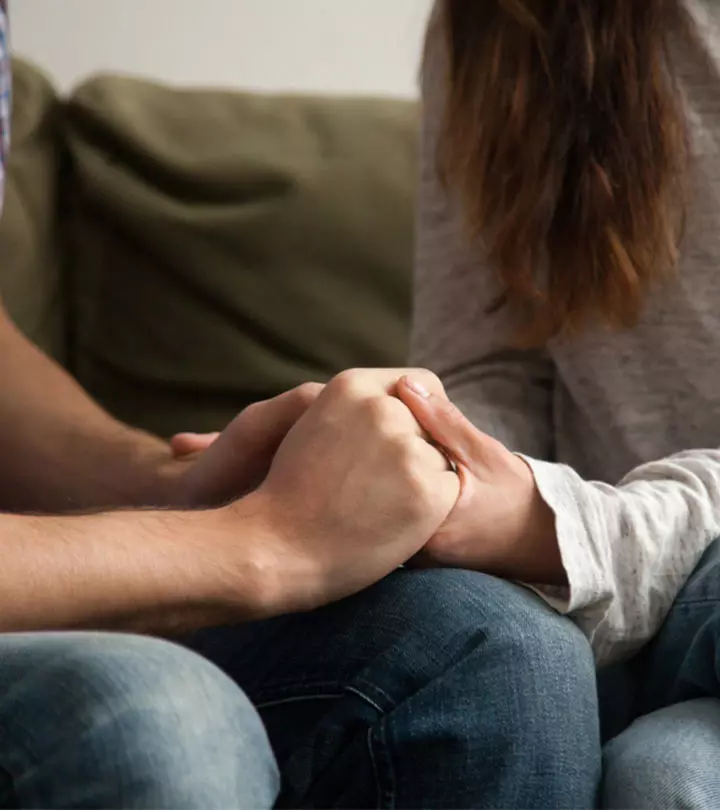










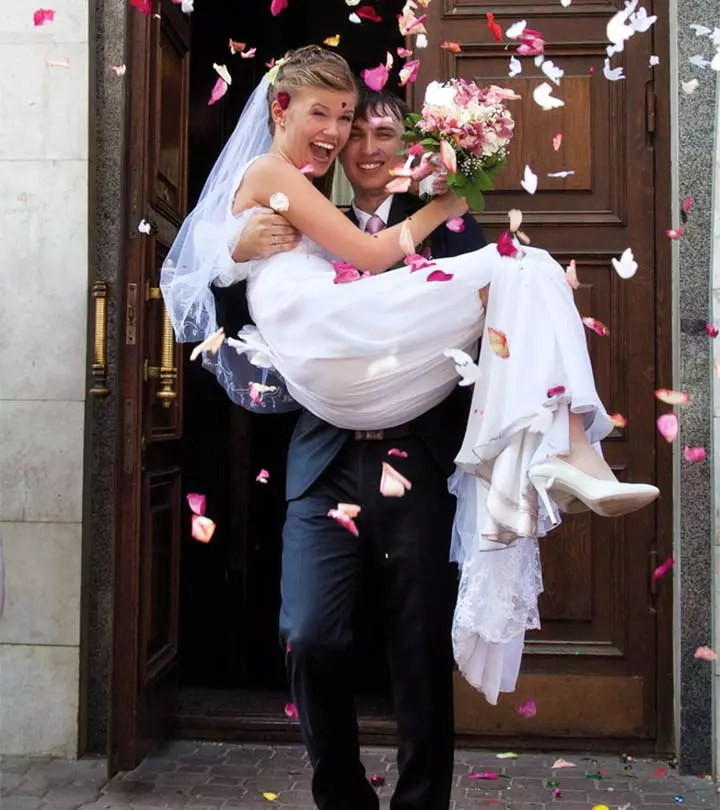

Community Experiences
Join the conversation and become a part of our empowering community! Share your stories, experiences, and insights to connect with other beauty, lifestyle, and health enthusiasts.